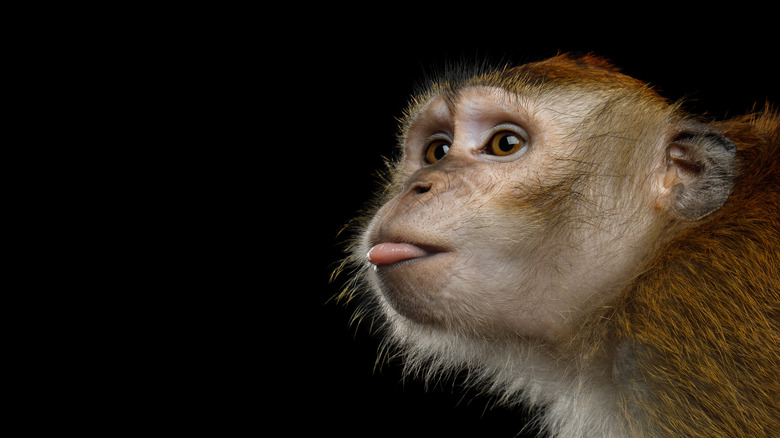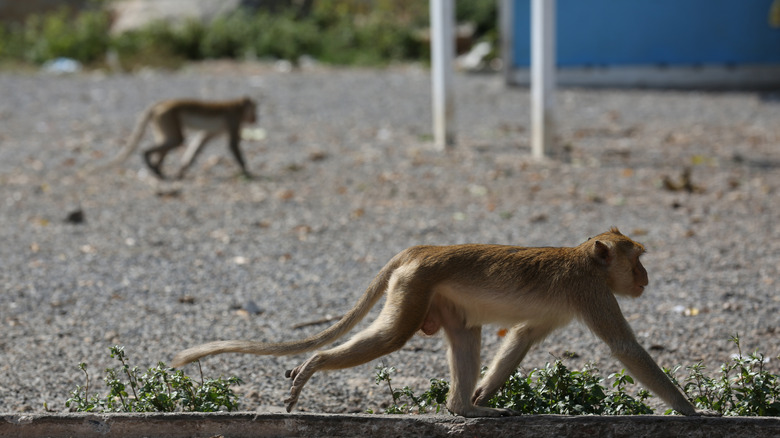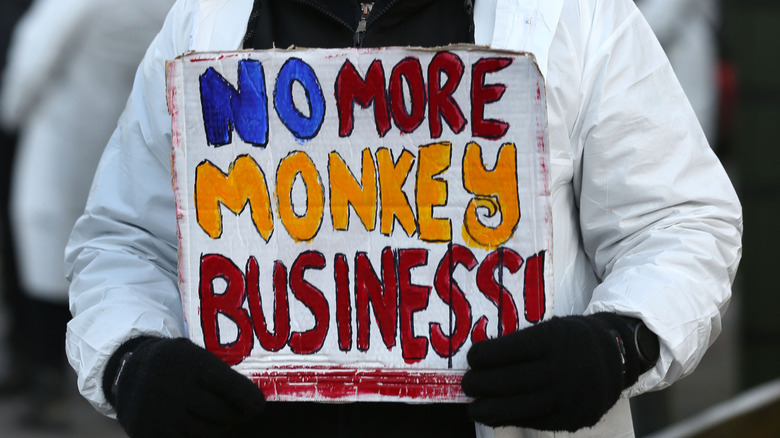The Bizarre Story Of Monkeys That Went Missing After A Crash
In January, a scene like something from the 1995 classic "Jumanji" film played out in Danville, Pennsylvania. No, there wasn't a bounty hunter on the loose, terrorizing a pair of young kids. And a stampede of elephants did not suddenly charge a residential home. But a group of monkeys did spill out onto the streets after a pickup truck collided with a dump truck transporting 100 of the animals, who were headed to a Centers for Disease Control and Prevention (CDC) quarantine lab, according to NPR.
This time, the monkeys didn't hijack a police car or trash a household kitchen like in "Jumanji," but they did launch a search party from local troopers, who used thermal imaging to track the roaming monkeys (via NPR). The incident triggered animal rights activists to get involved and much criticism directed at the CDC for mishandling the incident (per NBC News, The New York Times).
The search for the lost monkey
After the crash, in which neither human parties were seriously injured, local troopers in partnership with the CDC successfully located all of the monkeys except one, and euthanized three (in an email to NPR, a CDC spokesperson did not give a reason as to why the monkeys were killed). In a Tweet, local police reported the crash, warned citizens not to try and locate the monkeys, and advised them to avoid contact with them, since they were, after all, wild animals (via NPR).
However, Michele Fallon, who was driving behind the truck before the crash, seems to have missed that guidance. Fallon got out of her car to try and locate the lost animals, originally thinking they were cats instead of monkeys (per PhillyVoice). In her search, she touched many of the monkey's crates, stepped in their feces, and was even "hissed" at by one of the cynomolgus macaque monkeys, which were headed to the CDC facility after being imported from Mauritius, an Indian Ocean island nation in Eastern Africa. Fallon didn't find any of the monkeys in the end, and it wasn't until the following day that the search party finally turned up the final monkey (via NPR).
The potential exposure
Later that weekend, Fallon got pink eye and a cough, which she attributed to her exposure to the monkeys (via Daily Mail). In a letter to Fallon obtained by The Daily Mail, the CDC said that any physical contact with the monkeys was ill-advised since they hadn't yet been quarantined, and that people who handle the monkeys typically do so with personal protective equipment. Per the PhillyVoice, these long-tailed macaques can spread herpes B virus, and are commonly used in the lab because their DNA is so closely related to humans.
Unfortunately, that ill-advised contact was too late to be avoided for Fallon, so she was treated with an antiviral and given rabies shots for the potential exposure, according to PennLive. The CDC continued to monitor the monkeys in case any got sick, and told PennLive that they were all still healthy and hadn't developed symptoms. But the monkey spillage accident was far from over.
The bizarre nature of the incident led some conspiracy theories to spread online, including one blogger who claimed the CDC was releasing the next bioweapon — possibly triggered by the theory that Covid-19 began through a bat transmission in China — under the guise of these escaped monkeys. However, these claims were debunked by PolitiFact.
Animal rights activists get involved
In recent years, monkeys have been in very high demand to test the more than 100 Covid-19 vaccines in development, resulting in a shortage (via The Atlantic). As a result, the monkeys involved in the crash — which are one of the top two most commonly-used monkey species for animal testing — were highly valued, each estimated to be worth $10,000, according to PhillyVoice.
Animal rights activists have long condoned the use of monkeys and other animals in lab settings, arguing that there are alternative testing solutions that don't pose such risks to public health and harm animals, like research performed via supercomputers or "in vitro," meaning in a cultured dish or test tube (per EuroGroup for Animals). In light of the car crash, People for the Ethical Treatment of Animals (PETA) stepped in to urge the airline that sent the monkeys, Kenya Airways, to withdraw from future deals involving monkeys, according to NBC News.
The airline agreed to stop shipping monkeys, joining most other major airlines in doing so, according to The New York Times. Fallon was also confirmed to not have a disease from the monkeys. Instead her illness may have been caused by exposure to Covid-19, from a party she attended that night.



